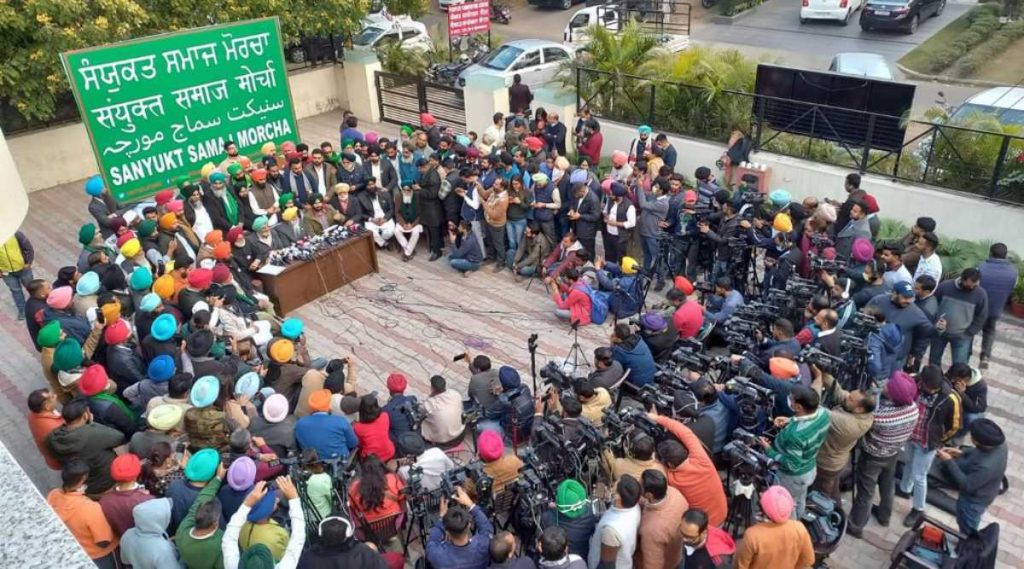The decision of 22 farmers’ unions to contest all the 117 seats in the coming Assembly polls in Punjab comes as a big surprise. These were earlier a part of the 32 unions that came together under the banner of Samyukt Kisan Morcha (SKM) to spearhead the farmers’ agitation against the three contentious farm laws. The SKM scrupulously avoided political parties during the year-long agitation and did not allow their leaders to join hands with them as they believed this would give a handle to the government to politically corner them and dilute the agitation backed by hundreds of thousands of farmers across the country. The farmers’ movement against the farm laws marks a watershed moment in Indian politics for being organised by apolitical outfits forcing a mighty government enjoying an overwhelming popular mandate to repeal the laws. By successfully delinking the agitation from political parties, which were eager to lend support to it, the SKM ensured it was not weakened by devious calculations of different political parties pursuing their respective agenda. In fact, the ruling party failed to break it despite using various methods to discredit and intimidate the farmers because the latter steered clear of political parties with diverse ideologies and narrow electoral interests. They successfully created the impression that they were together only to uphold the interests of the common man, the farmers.
When the country was led to believe how the common man, ordinary farmers can bring a government to its knees for working against their wish without taking help from political parties, the announcement of the 22 farmers’ unions to launch a political party – the Sanyukt Samaj Morcha (SSM) – and join the fray in the Punjab Assembly elections is a highly welcome step. Prime Minister Modi has been constantly speaking against hereditary or dynasty politics. In this modern age, Indian democracy should not be propagating dynastic rule. However, dynasts are not limited to family names only. If observed on a broader canvas, certain political thoughts perpetuate themselves and thus become dynastic. These old thoughts refuse to die out and do not permit new thinking or allow the youth to evolve. These thoughts are as deplorable and damaging to a democracy as a family. The Prime Minister’s statements aimed against dynasts are obviously aimed at propping up the Gandhi family as his only alternative. Thus, he forces people not to acknowledge other political ideas but limits their vision to the unwanted and decrepit Gandhis as the sole alternative. This also emboldens an alternative dynasty which, too, is unhealthy for Indian democracy to blossom.
The active involvement of certain farmers’ organisations in electoral politics should be viewed positively as a harbinger of change. It is often a criticism that only scoundrels and criminals enter the political fray. While condemning the average politician, no one ever suggests an alternative way out of the morass. The Punjab farmers’ decision could possibly be one of the ways out. This process might, just might, infuse new blood and new ideas into mainstream electoral politics. It is necessary that Indian elections change flavor from false promises and hatred to workable ideas that can involve the average citizen in the task of rebuilding society. A nation like India is not just a geographical boundary guarded by Lines of Actual Control (LAC) or Lines of Control (LOC) with rifle-wielding soldiers guarding them. It is wrong to assume that one religion professed by the majority has been the unifying factor for this nation. Although Hindooism is practiced throughout this country, yet it is not bound by one single concept or even one God. Many may be surprised to learn that there exist more that 300 versions of the Ramayana. If a parallel is drawn then whole of Europe with multiple languages, food and customs but with only catholic Christianity should have been one single country. Looking at India, it is vital to recognise the diversity that surrounds everything here. Electoral politics must necessarily reflect that social diversity with strength and purpose. Therefore, new people with novel ideas must be welcomed into the electoral system which, in turn, would propel them to seats of power.
Historically, every major social movement has produced great political beneficiaries. The freedom struggle brought the Indian National Congress to power and kept it at the helm of the country for a very long time. Similarly, many big and small regional movements such as the Dravida movement created strong regional political outfits which enjoy power even till today. A more recent example would be that of Anna Hazare. While Arvind Kejriwal and his Aam Aadmi Party were a by-product of the so-called anti-corruption movement, the real big beneficiary was the BJP and its ideology. It may be presumed that this tenacious farmers’ protest could produce political offspring which may or may not be socially positive.
